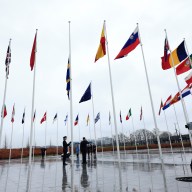By Claire Milhench
LONDON (Reuters) – Global investors, fretting over economic growth and Brexit, have cut equity allocations to underweight for the first time in four years while raising cash to the highest in almost 15 years, a Bank of America Merill Lynch survey showed on Tuesday. BAML’s monthly global survey of fund managers showed a sharp reduction in risk-taking across the euro zone and the UK after Britain’s June 23 vote in favor of leaving the European Union. The outcome of the referendum wiped billions off share prices, pushed sterling to a 31-year low against the dollar and has raised fears of a recession in Britain.
The International Monetary Fund has also cut its global growth forecasts for the next two years, citing the “sizeable increase in uncertainty” due to Brexit, which is expected to take a toll on investment and consumer confidence. In last month’s survey, 30 percent of respondents had identified Britain leaving the European Union as by far the biggest ‘tail risk’ for world markets.
Not surprisingly then in this month’s poll fund managers have voted with their feet, cutting their UK equity allocation to a net 27 percent underweight from a net 23 percent underweight. What’s more, the percentage of investors looking to short UK equities was the highest since December 2009, the survey revealed. Allocations to euro zone equities also tumbled to a net 4 percent underweight from last month’s net 26 percent overweight. This is the first Eurozone underweight in three years, BAML said.
“For the first time in three years, global investors are underweight European stocks. Europe finally belongs to the bears,” Manish Kabra, BAML’s European equity quantitative strategist, told clients. Cash balances in global portfolios are now at 5.8 percent, up from 5.7 percent in June, the highest since November 2001, according to the survey.
The Brexit blow also put investors in a pessimistic mood about global growth prospects, with expectations slumping to a five-month low. Only a net 2 percent of respondents now expect a stronger economy in the next 12 months, a sharp fall from a net 23 percent last month. Fund managers also fretted that policymakers were failing to get a grip on the economy, with a record net 44 percent saying global fiscal policy was too restrictive.
This could account for the leap in the numbers expecting central banks to resort to “helicopter money” – where a central bank directly finances budget stimulus.
The survey showed that 39 percent of investors expect helicopter money in the next 12 months, up from 27 percent last month.
Away from UK and European equities, investors showed some propensity to put on risk, with the allocation to emerging equities improving to a 22-month high. Emerging market stocks <.MSCIEF> are up about 3.5 percent since the June 23 referendum. The allocation to U.S. equities also jumped to a net 9 percent overweight from a net 15 percent underweight last month. This is the first overweight to U.S. stocks in 17 months, BAML said.
A total of 195 participants with some $537 billion under management responded to the poll, which was carried out between July 8-14.
(Editing by Jeremy Gaunt.)
















